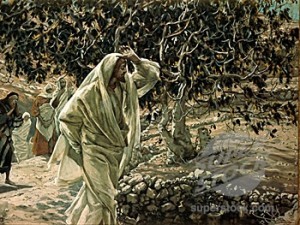In all three of the synoptic gospels, the first thing that Jesus does early in Holy Week is drive the buyers, sellers, and moneychangers out of the Temple, overturning their tables and causing a general ruckus.  Both Matthew and Mark also report that on one of the early days of Holy Week Jesus cursed a fig tree because it had all leaves and no figs, even though it was not the right season for figs; the tree subsequently withered and died. Thousands of pages of commentary have been written seeking to provide the “real meaning” of these and similarly familiar events, but one thing is immediately clear from these stories: Jesus occasionally got angry.
Both Matthew and Mark also report that on one of the early days of Holy Week Jesus cursed a fig tree because it had all leaves and no figs, even though it was not the right season for figs; the tree subsequently withered and died. Thousands of pages of commentary have been written seeking to provide the “real meaning” of these and similarly familiar events, but one thing is immediately clear from these stories: Jesus occasionally got angry.
For those who believe that Jesus was fully human, this should not be a surprise, given that anger is a typical and frequent human emotion. We also know that anger is one of the most dangerous human emotions, often leading to destructive and ill-advised actions. In the religious world of my youth, we were very uncomfortable with the possibility of Jesus’s being angry. We reserved the term “righteous anger” for situations in which we could not explain Jesus’s anger away easily.
Let’s assume there is such a thing as “righteous anger.” Jesus’s cleansing of the Temple is often pointed to by Christians as the primary proof that sometimes anger is justified and appropriate. But no one ever has suggested that his one-off anger episode changed anything permanently; chances are the moneylenders and sacrificial animal vendors were back on the job the next day. Justified anger is directed, as the phrase indicates, at injustice—something our society and our world is full of. Justice is one of the highest of human virtues, and we seem hardwired to recognize when it is violated, even though there is seldom agreement about what justice would even look like.
Anger has been a staple of the political landscape for so long that many have concluded that it is the only possible emotion energetic enough to fuel real change. It is difficult to effect change when the people you need in the trenches of the revolution are relatively satisfied with the way things are going. What if the French peasants and working classes had said, “Well, things really aren’t that bad” in 1780s France? What if the majority of American colonists had thought, “Actually, I can sort of see why the British Parliament wants to tax us without representation”? Of such attitudes a revolution is not made. Must anger and dissatisfaction be the primary driving forces behind meaningful change?
The prophet Micah writes that what God requires of us is to do justice, love kindness (mercy), and walk humbly with our God. But in many ways, Jesus’s message in the Gospels transcends both justice and mercy, opening the door to something altogether different: grace. Justice is about fairness and mercy is about choosing to treat those who have done injustice as if they had not done so. But grace is something altogether different, an awareness that, in human hands, justice is often a zero-sum game, a game whose rules have to be rewritten if we are ever to establish true change.
Grace empowers a vision of human reality in which individuals are not lumped into categories, in which justice is not calculated mathematically, in which fairness is energized by a recognition of equal dignity rather than rights and entitlements, and which, as novelist and essayist Marilynne Robinson writes, inspires “the intimation of a great reality of another order, which pervades human experience, even manifests itself in human actions and relations, yet is always purely itself.”
Those inspired by grace rather than justice must realize that grace cannot be institutionalized. Although a world or society of perfect justice has never existed, most human beings can imagine what such a society might look like—some of the great works of literature and philosophy provide us with glimpses. Grace is of a completely different order, calling for individuals and collectives to bring a transcendent, divinely inspired energy into mundane human activity.
When Jesus advocates perspectives and actions that make little common sense but are strangely attractive and beautiful, he’s describing grace. We engage with it and come to understand it more effectively and deeply through parables, stories, and examples rather than rules and moral principles. And it cannot be systematized. But the good news is that it is applicable everywhere.
For reflection: As noted in a previous section, Anne Lamott writes that grace is when “suddenly you’re in a different universe from the one where you were stuck, and there was absolutely no way for you to get there on your own.” What are some examples of grace in your own life?













